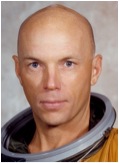
09/16/2011
After six trips to outer space and 25 million miles of travel, former NASA astronaut Story Musgrave says he has accumulated enough frequent flyer miles to earn him a one-way ticket to the sun.
Musgrave, who is also a trauma surgeon, mathematician, chemist, biophysicist, palm farmer, skydiver, physiologist, computer scientist, landscape architect, military jet pilot, artist and author, will headline SUNY Cortland’s Family Weekend. Musgrave will address students and their guests at 8 p.m. on Saturday, Sept. 17, in Old Main Brown Auditorium.
The event, which kicks off the 2011-12 Campus Artist and Lecture Series (CALS), costs $5 for general admission and is free for all students and preschool children. College students must bring their ID. Tickets can be purchased in Corey Union, Room 406, or at Brown Auditorium beginning one hour prior to the performance.
“You look at his résumé and it looks like a work of fiction,” said SUNY Cortland President Erik J. Bitterbaum. “You see six graduate degrees and a long list of professions related to the arts and sciences. In every way imaginable, Story Musgrave is a champion. He personifies the aggressive curiosity, goal-oriented involvement and well-rounded lifestyle that SUNY Cortland seeks to nurture in its students.”
A NASA astronaut for more than 30 years, Musgrave performed the initial shuttle spacewalk of Challenger’s first flight and served as lead spacewalker on the Hubble Space Telescope repair mission. He helped design the spacesuit used on shuttle flights, then tested it himself on a space walk. He is the only NASA astronaut to have flown missions in all five space shuttles.
“There are forks in the road and you get ready to embark on something else,” Musgrave said, when asked why he pursued six advanced degrees and at least that many various careers. “That’s just how education unfolds.”
Musgrave has delivered more than 3,000 talks at universities, corporations and conferences on various topics. He is usually the first to arrive at his presentations and the last to leave. He can speak on a variety of subjects — everything from motivation to innovation — but said he has not settled on a topic for his presentation at SUNY Cortland.
“It doesn’t matter where I speak,” Musgrave said. “The lesson is the same.”
The lesson is maintaining a “one step at a time” approach to life, he said. Musgrave has employed that plan of action in his own life, from his days as a farm child in Stockbridge, Mass., to his time as an undergraduate student at Syracuse University, to his current role as a professor at Art Center College of Design in Pasadena, Calif.
“You end up some place you never planned to,” Musgrave said. “There was no space program early (in my life). Sputnik went up at the end of my Syracuse career. I didn’t know what that meant to me and no one else did either.”
Musgrave spent his early career working with computers. After he obtained a master’s degree in operations analysis and computer programming from University of California, Los Angeles in 1959, he returned to Syracuse for pre-medical work. From Syracuse, he moved to Columbia University where he studied surgery and physiology of the brain.
“Then space happened,” he said.
Musgrave saw that NASA and the National Academy of Science started to pursue a flying program for people with a doctorate degree.
“I saw that and said: My (gosh), that’s me,” Musgrave remembered. “I told myself: I’m ready for that job. I’m a fit.”
Between his earlier service in the U.S. Marines and his astronaut career with NASA, Musgrave accumulated 18,000 hours — more than two years worth of time — in flight. He conducted two classified Department of Defense missions and operated an electronic chip-manufacturing satellite on the shuttle Columbia. He also communicated in mission control for 25 space shuttle launches.
But Musgrave does not point to space or science for his crowning achievement. The man who has been awarded 20 honorary doctorates said he is most proud of his “farm kid” past. He roamed forests and built homemade rafts as a youngster. By his teenage years, he repaired trucks and tractors in remote fields.
“That set the stage for everything else because I was an intuitive, brilliant mechanic,” Musgrave said. “I took up the piano at five, not 50. Everything else I did in life comes back to that, whether it’s my being a trauma surgeon or fixing people or fixing Hubble or fixing airplanes in the Marines or the landscape company that I run today.”
Musgrave, who resides in Orlando, Fla., took time out of a recent California vacation to answer questions about his upcoming presentation in Cortland. When asked what his vacation entailed, the 76-year-old replied that he was trying to develop an artificial blood substitute.
“It’s massively important and it’s a very simple problem with a very difficult solution,” said Musgrave, who works part-time as an innovator for Applied Minds, Inc., a California-based consulting company.
The man who pursues his passions wherever they fall will soon speak in Central New York. And he will bring with him the arsenal of stories and life lessons he has picked up during millions of miles of space travel.
“I’ve only done one percent of what there is to do,” Musgrave said modestly. “I’m still working at it.”
For ticket information or questions regarding CALS events, please contact the Campus Activities and Corey Union Office at (607) 753-5574. Musgrave appears by arrangement with The Bazel Group, Inc.